Director RZA
As leader of the legendary multi-platinum selling rap group, The Wu-Tang Clan, RZA, or Bobby, as he is known to close friends and colleagues, had a particular way of putting beats to razer-sharp lyrics that made you feel part of a song’s creative process. Fans feel RZA’s music, both from Wu-Tang and his solo and collaborative efforts, on a cellular level.
An urban-bred intellectual who expresses through a mic or camera lens, RZA is considered prophetic to his community and perhaps a unicorn to mainstream culture. With a penchant for Eastern philosophy as is evident in the name Wu-Tang Clan and lyrical nods to Shaolin Kung Fu, RZA shared, “One thing I’m looking forward to doing in the near future… I’ve never been to India, and I have to check that one off,” referring to the top item on his bucket list. I recommended he connect with Indian author and yogi, Jaggi Vasudev, also known as Sadhguru, when he makes the trip. RZA is so well-read and well-versed, it felt novel giving him someone and something beyond his scope to Google.
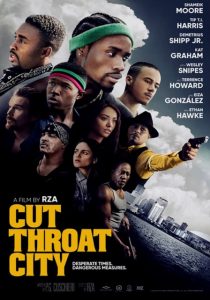 As a film director, RZA paints complex portraits with colorful multi-faceted characters that inspire engagement and empathy. His latest directorial effort, the allegorical Cut Throat City (streaming on Netflix) features an all-star cast and examines the lives of people living in New Orleans’ economically depressed Lower Ninth Ward in the aftermath of 2005’s Hurricane Katrina. The historically disastrous storm broke through poorly constructed levees, flooding out the city’s most vulnerable residents, and leaving them with little hope or help from FEMA. Much like our current pandemic, Katrina shone a light on shameful racial and economic inequities. Though the film’s story is a sobering one and the lead character’s decisions are morally ambiguous, he insists the film portrays “a story of redemption,” with parallels to his own life.
As a film director, RZA paints complex portraits with colorful multi-faceted characters that inspire engagement and empathy. His latest directorial effort, the allegorical Cut Throat City (streaming on Netflix) features an all-star cast and examines the lives of people living in New Orleans’ economically depressed Lower Ninth Ward in the aftermath of 2005’s Hurricane Katrina. The historically disastrous storm broke through poorly constructed levees, flooding out the city’s most vulnerable residents, and leaving them with little hope or help from FEMA. Much like our current pandemic, Katrina shone a light on shameful racial and economic inequities. Though the film’s story is a sobering one and the lead character’s decisions are morally ambiguous, he insists the film portrays “a story of redemption,” with parallels to his own life.
“No one [in this film] is completely bad and no one is completely good. They were all flawed. It exemplified their humanity and it comes down to a choice. The theme of [Cut Throat City] examines the importance of dreams against a backdrop of survival.”
Reflecting on his early days in the spotlight, RZA denounces some of his youthful bravado as he recites a trademark Wu-Tang lyric for me, “Wu-Yang Clan ain’t nuthing ta fuck wit,” and laughs out loud at an ego-driven existence that took center stage early on. It’s now tempered, he says, by a need to serve something greater than himself. Throughout our conversation, RZA’s words are prophetic, culturally provocative and spiritually centered. We talked about a life lived outside the matrix of material trappings; a topic initiated by him and encouraged by me.
Allison Kugel: Do you believe anything is possible, or that circumstances dictate our destiny?
RZA: Wow, that’s a strong question. I think that persistence overcomes resistance. Therefore, every possibility is actually expressed in our children’s wishes. The things we wish for as young minds and things we thrive in our spirits for, I think they make that which seems impossible, possible. The whole Greek study of Icarus and the idea of men flying… that seems like it would be magic or some other thing. We fly every day now in many different variations of flight, for example, flights that leave our basic atmosphere and travel across the whole world. So, what seems impossible, I think positivity and possibilities are probably boundless.
Allison Kugel: What lessons can be learned from poverty, and what lessons can be learned from wealth?
RZA: Poverty and wealth are two very different circumstances, but those are physical circumstance. I think we have to be conscious to not have the physical circumstance truly shake our spiritual and our personality. I grew up in poverty, but I was never unhappy. Joy and love were in our household. My mother was a single mother, but joy and love made up for the lack of food and shelter. The point I make in saying that is, of course, in a capitalist society our freedoms are compartmentalized. Therefore, you could be physically free and not spiritually free. You can be spiritually and physically free, and not economically free. Since economic freedom is a requirement for proper food, clothing, and shelter, it can become something that transcends the physical, and bleeds into the spiritual. If life was simple, everything we want is already provided for us by the planet. There is nothing on this planet that we eat, ingest, take, dance with, fly with, that is not from the planet. It’s just that when you are dealing with certain [economic] systems, they take control over us. Even in some religious traditions they have ways of controlling what is naturally ours. I’m out here in New Jersey in the woods right now, and I just saw some deer walk by. A whole family [of deer] eating whatever they ate and they keep walking.
Allison Kugel: I had a similar moment when I looked at a family of birds outside my house, and they don’t need anything. They’ve figured all of it out for free, on their own.
RZA: Yes! There is a beautiful verse in the Holy Quran that speaks on that. I’ll paraphrase it. It says something like, “The birds and the bees are taking care of every day with no worries. Do you think Allah would do less for man, his greatest creation?” Everything they have access to, we have access to. It’s that we grabbed control over it and denied access to certain people. That’s playing into the theme of my film (RZA’s latest directorial effort, Cut Throat City, streaming on Netflix).
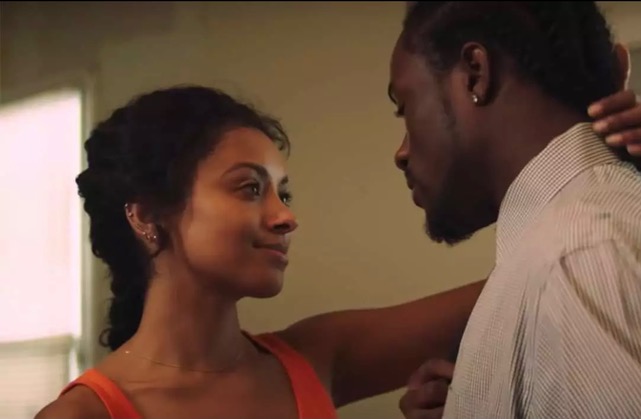
Allison Kugel: Yup! That’s why I’m asking about it…
RZA: One of the biggest issues of the situation in this film that I hope the audience catches is that Blink (played by Shameik Moore) goes in with his wife (played by Kat Graham) and child for help from FEMA and they ask, “What is your salary?” She says, “About $32,000.” Not a bad salary and not a great salary…
Allison Kugel: It’s a hard salary. It’s a salary that would be very challenging to raise a family on. Would you agree?
RZA: Yes, I would agree. And within that salary she’s paying a third of that in taxes. Her tax money is paid into a system to protect her when the time comes that you need the protection. Now here it is, I’m in need of what I paid into and I’m being denied because of my community or because of my race. That is the equation we overlook in our capitalist society. The money that they spend every year is not their money, it’s our money that they are controlling.
Allison Kugel: After watching your film, Cut Throat City, which depicts the lives of people living in New Orleans’ Lower Ninth Ward in 2005, post-Hurricane Katrina, I researched and read that in 1965 there was also a catastrophic hurricane in the area. Same thing happened, where the levees were not maintained properly and they broke. They already knew there was a strong possibility it could happen again, and yet they did nothing to protect these people.
RZA: The line that Ethan Hawke gives in the film, he talks about how it also happened in the early 1900s, but it was more intentional. They let the levees break so the water could flood the lower land and it wouldn’t spread up to the white districts. The thing about separation of people who are of color or [lower] economics, it has existed for a long time in our country and there is no relief and no delivery from the situation. Even if the Lower Ninth was built to be low income, as your city is growing and your tax dollars are coming into your city, those resources should be used to ensure everyone’s safety and security. In the beginning of the city’s history, I understand. I started in a small apartment when I left my house. I was nineteen years old and my mother said the time had come to go. I started in a small apartment and (Wu-Tang Clan member) Ghostface [Killah] was my roommate. We had another roommate, my cousin Rob. We lived there, three guys in a one bedroom, and we stayed there until we raised enough money to get a two bedroom (laugh). You know what I mean?
Allison Kugel: (Laughs) Yes! I do know what you mean.
RZA: We kept going, and it even got to the point where one of us could move out and one of us still stayed, and that lasted until we hit it big. The point is, it’s okay to start at the bottom and struggle, but when there is no relief from the struggle, that is when it becomes insidious, evil, and oppressive. Like I said, the money that FEMA was giving in 2005 for Hurricane Katrina Relief was the money that came from the people. It wasn’t [FEMA’s] money.
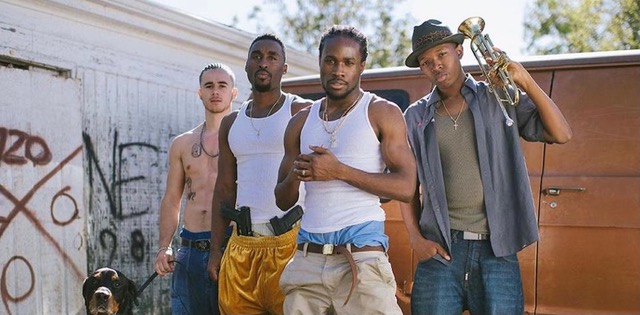
Allison Kugel: I’m assuming you spent time in New Orleans prior to directing Cut Throat City?
RZA: I traveled there many times and spent three weeks studying the city. This film wasn’t just about these four guys in the aftermath of Hurricane Katrina. It was the fact that this was a story about what happens when your aspirations turn into desperation. That I know, that I’ve felt, and that I’ve lived. I come from a single mother household and so does my whole crew. Seven of the nine members [of Wu-Tang Clan] are that. In this film, Blink (the film’s lead character) was a nerd, in all reality. He was an academic and went to college. He had a talent, you know?
Allison Kugel: That is what is so heartbreaking about this story. Here is a guy who went to Tulane University, who has extraordinary talent for drawing and storytelling, and it’s wasted talent. It’s a squandered life. But then at the end of the film, there are two different endings. Explain that…
RZA: A lot of people have been tweeting about that and asking what’s going on. The artist in me left it up for interpretation. If you go back and look at the film closely, you’ll see that there is an egg in there that should answer the questions. Maybe people missed it, but the reason why I did that is because in life, very few of us get second chances. But, what happens if you give a man a second chance? I, myself, am a second chance-er. When I read this story, I felt the character Blink all in my system. I felt his pain. Then I realized I actually was an artist and a smart guy who got caught up in gangs and the streets, and ended up facing eight years in jail, but I won my trial. When I won my trial, I changed my life. I focused on study and making myself better, looking at my creativity, and I formed The Wu-Tang Clan. I became a success story, because I was given a second chance.

RZA: And I wasn’t bad. A lot of people are not bad, they just made a bad decision. [I wish] the criminal justice system could look at it that way. Most of the guys in the Wu were the same. We were all arrested felons or something like that, and we had a second chance. I wanted to express that in this film. In the original screenplay, though, I have to be honest, he dies. But as a director I get to tell the story and I get to shape it. I wanted to shape it with optimism. I said, “I’m going to leave some optimism there and let the people who watch it decide, which pill would they take?” In the film the detective tells him, “A pen will get you further than a gun.” I’m living proof. It was a pen that got me further than anytime I was trying to do something foolish with a gun.
Allison Kugel: Speaking of which pill to take. You strike me as a guy who operates outside the matrix. I know you’re part of the Five Percent Nation. Do you sometimes feel like you don’t quite sync up with the everyday person?
RZA: No. I don’t feel like I don’t sync up. I feel blessed that I see the beauty of what I see. Whether anybody else sees it or not, it’s okay. It’s not like, “Man, wow, they’re missing it.” Even as a vegan and never having a yearning for steak, never having the idea in the back of my head of the pain I’m inflicting on someone else; it’s a very liberating feeling to not be the cause of pain and turmoil to any living thing. I actually feel more required to do what I’m supposed to do, so that if there is positivity in what I’m doing, may others see it. They’ll see it in their own given time, and I’m okay with that.
Allison Kugel: Do you want to explain what the Five Percent Nation is?
RZA: I’m going to tell you something they taught us in studying the lessons of The Five Percent, and it is sometimes misunderstood. What they are trying to say when they say, “Five Percent,” is they took a number of 100% and they separated it into the different types of people in the world. They say that 10% of the people know the same things that the five percent know, but the 10% use it to control other people. They know that there’s falsehood. They know it’s a game, they know the rules of the game. They aren’t playing it, but they’re making everybody else play it. They say 85% of people are easily led in the wrong direction. The 10% will lead them in the wrong direction even though they know the right direction. Then there’s 5% of the people who know the right direction and they strive to teach it. Scientists who deal with quantum physics and the measurement of space, they say all the atoms in the entire universe only represent five percent of the universe.
Allison Kugel: And the rest is space.
RZA: The rest is space. It’s a mathematical equation. They taught us that we should all strive for the Twelve Jewels of Life which is: knowledge, wisdom, understanding, freedom, justice, equality, food, clothing, shelter, love, peace, and happiness. If you have that, you’re rich. I honestly feel I have that, and to me, that is more valuable than anything that is out there. In my art, I try to express those qualities.
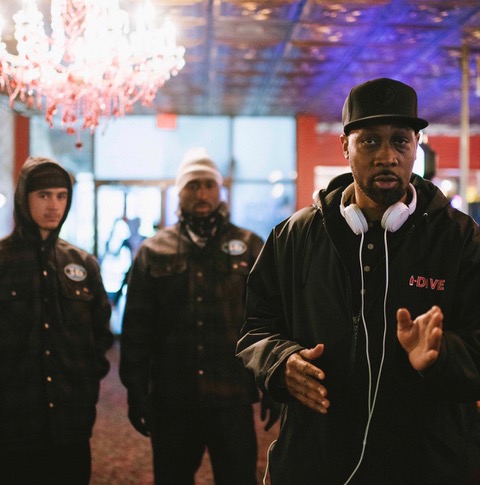
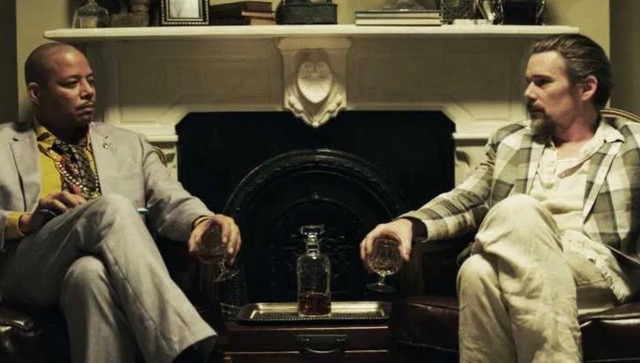
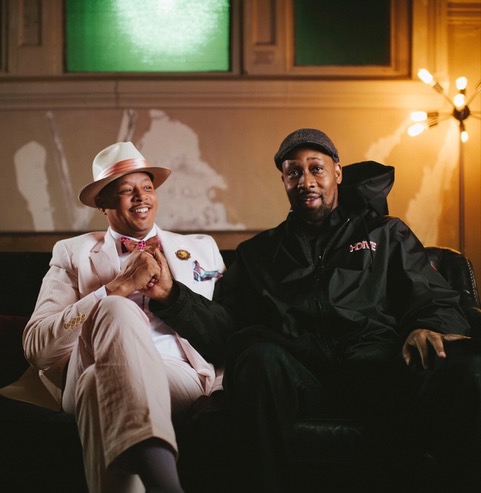
Allison Kugel: In the film who would you say was the most fun to direct, who was the most challenging, and who did you vibe with artistically?
RZA: Wow, it’s hard to separate such a great cast and great talents. Every one of us had our moments, like an all-star team. I can say that Kat Graham really shows that it’s not just beauty in her, but it’s her strength and expression. I’m glad that she became the anchor of that family, and she did it beautifully. She could have played it pretty and sexy. Even though she was beautiful on screen, it was natural. She was strong to go and fight for her man. Ethan Hawke, I felt like we were on a natural high working together with the way the ideas were flowing back and forth, and his choices of emotions. And as a fan, it was a joy to have Terrence Howard, Wesley Snipes and Isaiah Washington come and work in my film.


Allison Kugel: Did you originally think Kat Graham was too pretty for this role?
RZA: No, that wasn’t a thought. I got lucky to get Kat. We had developed her role for another actress who became unavailable about two weeks before we were shooting. Then our agent said that Kat Graham read the script and was interested, and would I be interested to talk with her? We did a FaceTime and she said exactly what I needed to hear.
Allison Kugel: Which was?
RZA: She said to me, “The strength of this woman is in the pages, Bobby, and I want to bring you that strength.” It wasn’t about bringing beauty; it was about bringing me strength. Then when you look at T.I., he totally shocked me and blew my mind. T.I. also came into the cast late. I had been developing the film for five years, and I always wanted Method Man to play the role of Cousin, but he told me he wasn’t into the bad guy roles right now.
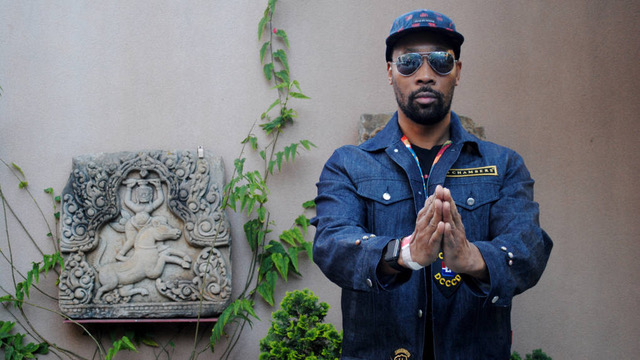
Allison Kugel: What do you want people to take away from the film, Cut Throat City, beyond being entertained?
RZA: I would like to think the people who see these four main characters in the film as criminals can now understand that they are a victim of circumstance. If we can walk away and understand that some people who are in bad situations are victims of circumstances, we can prevent the circumstances. I don’t know if that makes sense to you.
Allison Kugel: That makes sense.
RZA: How do we prevent the circumstances? Before I started the movie, I met with a guy who was locked up and he told me he read an article about me and he agreed with what he read about me. I asked him, “Which article was that?” He said it was an article where I said I was a nerd. And I was like, “Yes, I am. I like comic books. I like video games. I like chess.” He said, “I loved reading that about you, because I’m a nerd too!” This guy was serving 15 years for armed robbery. He was saying that really, he is also a creator, but there was no outlet for him. So he got caught up in a hustle. There was another guy that was in the cell with him who ended up fixing all the computers inside the jail, but he’s in for murder. I’m not justifying a murder, but he said that he was bullied and bullied and bullied. He was forced to fight, and once he fought it was like he became a cowboy.
Allison Kugel: Here is the question I ask everybody. What do you think you came into this world to learn, and what do you think you came here to teach in this lifetime?
RZA: Wow, that is a beautiful question. What did I come to learn? One thing I am learning is humility. Even though I may appeared, on the surface, to have it, it was something that I think I lacked. I was pretty conceited, really coming up. If you listen to my old music, I acted like, “I’m the greatest and everybody else is beneath me (laughs).”
Allison Kugel: Well, you were in your twenties, right?
RZA: Yes..
Allison Kugel: Hello! (laugh)
RZA: Exactly. But it’s good to understand that there is a universe out there. You can be a sun, but there’s other suns. But I do think what I’m destined to teach, if anything, is that you can be a living example of your own ideas. Through my art, I’ll be able to inspire and that’s the best thing. I think I was brought her to inspire. I was born to inspire.
RZA Photos Courtesy of CAA, Film Stills Courtesy of Well Go USA Entertainment/Netflix
Cut Throat City is currently streaming on Netflix. Follow RZA on Facebook and Instagram.
Allison Kugel is a syndicated entertainment and pop culture columnist and author of the book, Journaling Fame: A memoir of a life unhinged and on the record. Follow her on Instagram @theallisonkugel and at AllisonKugel.com.






